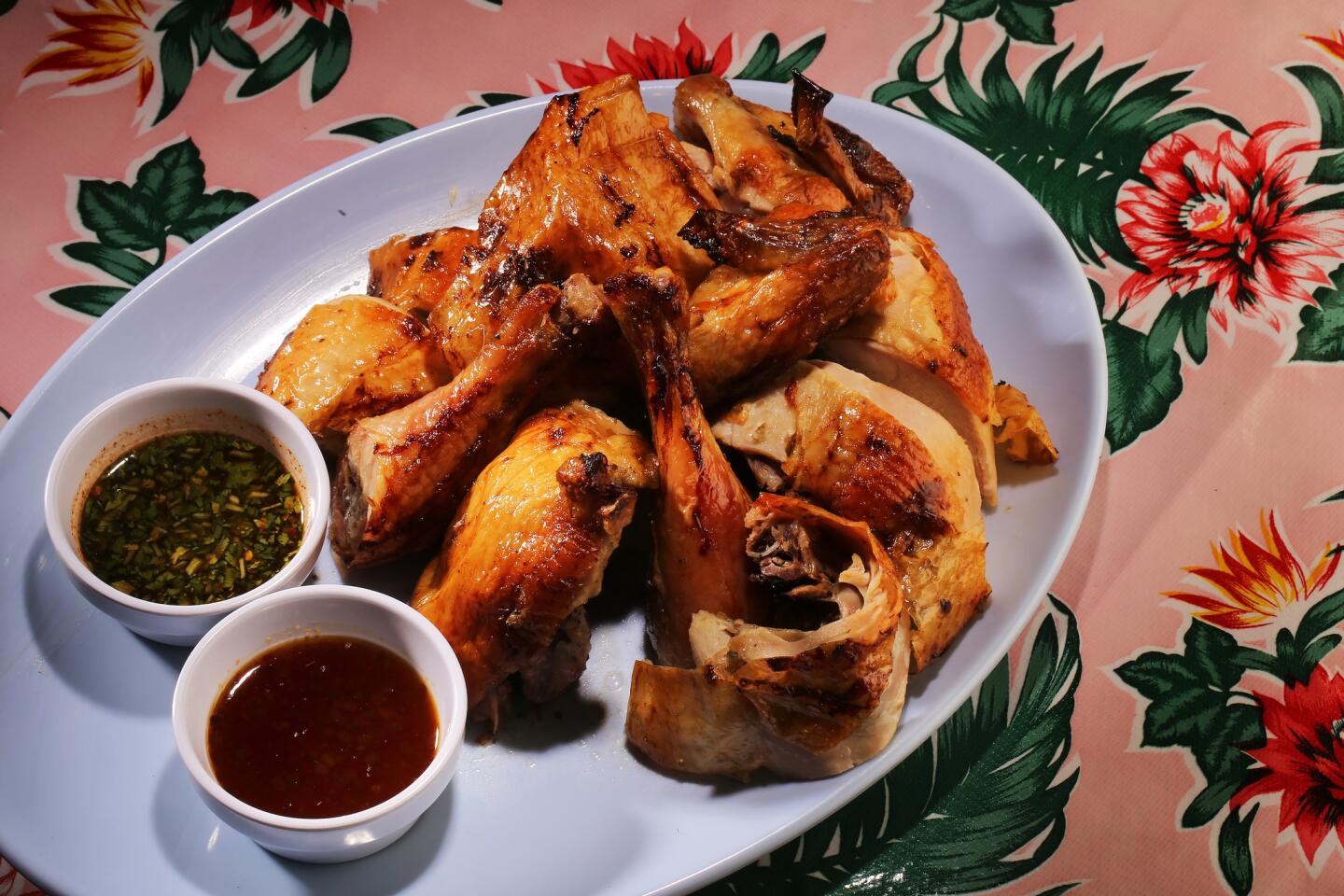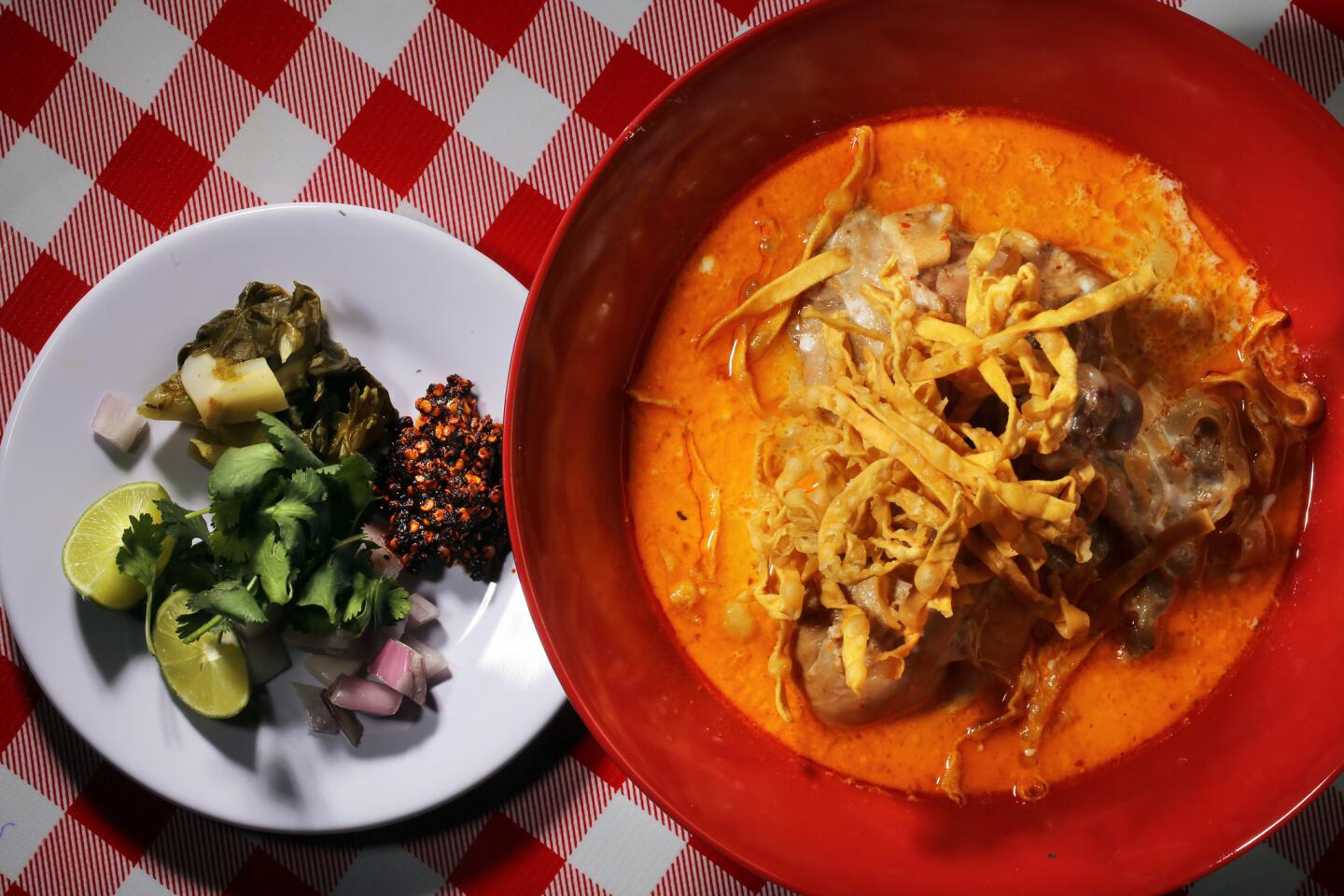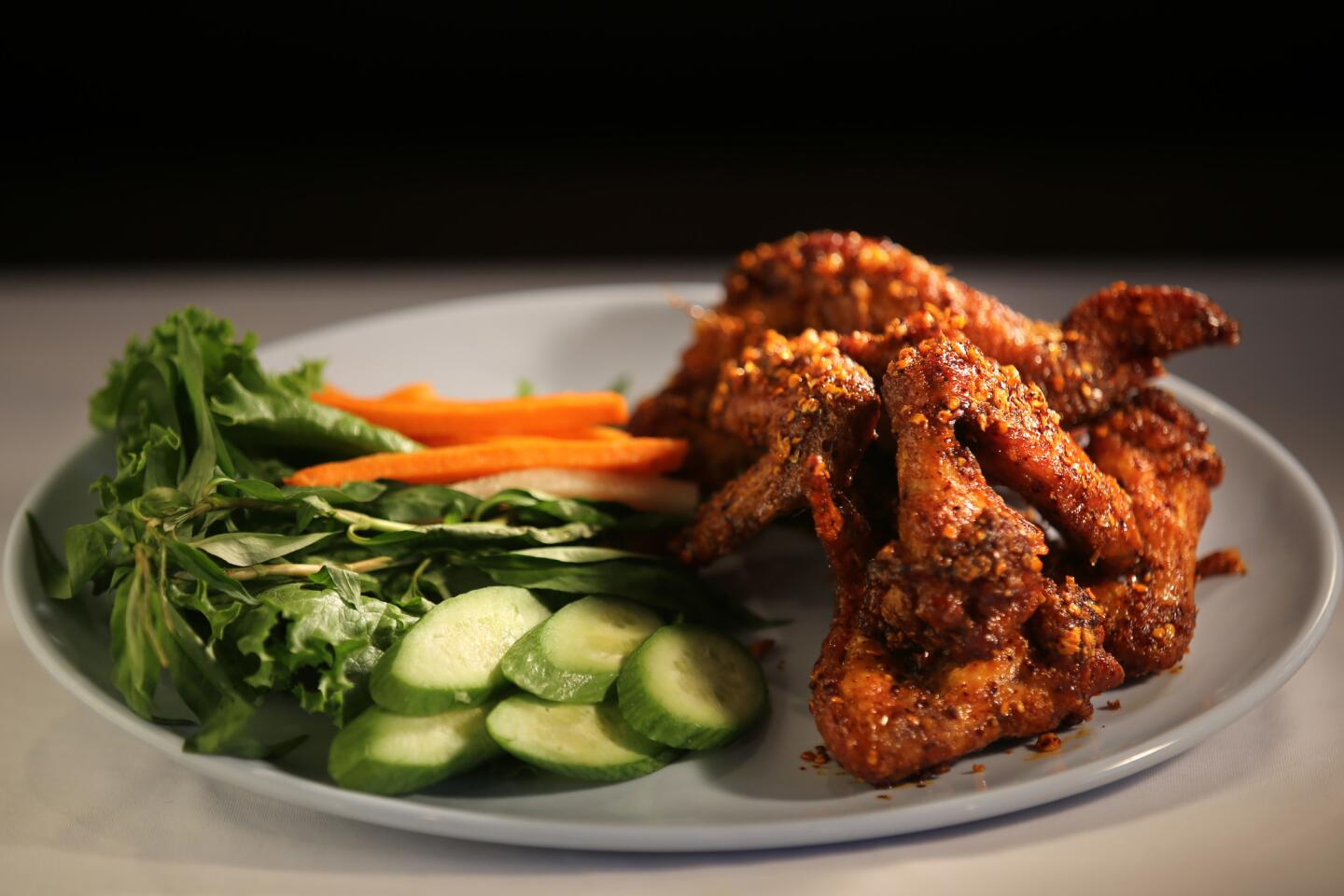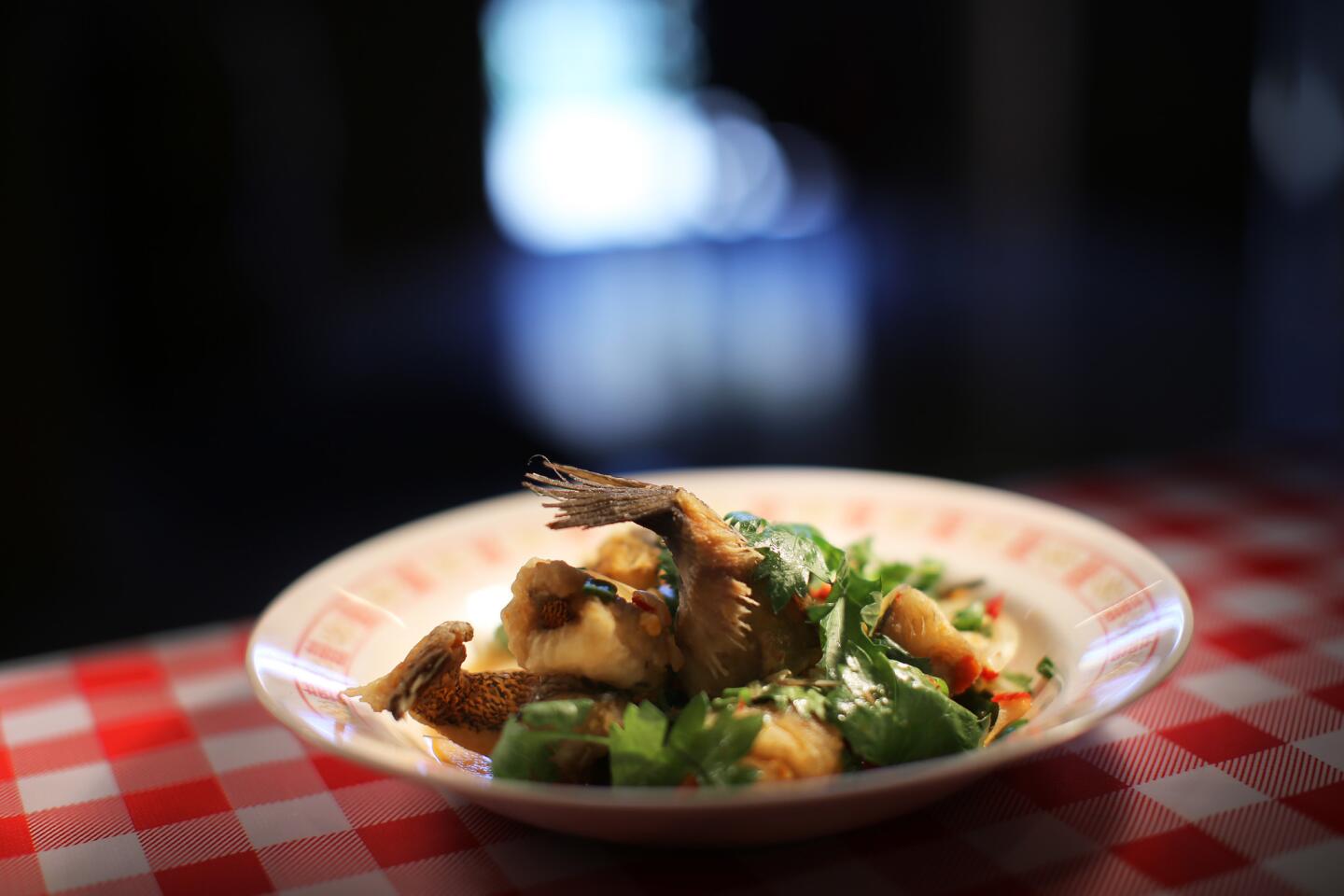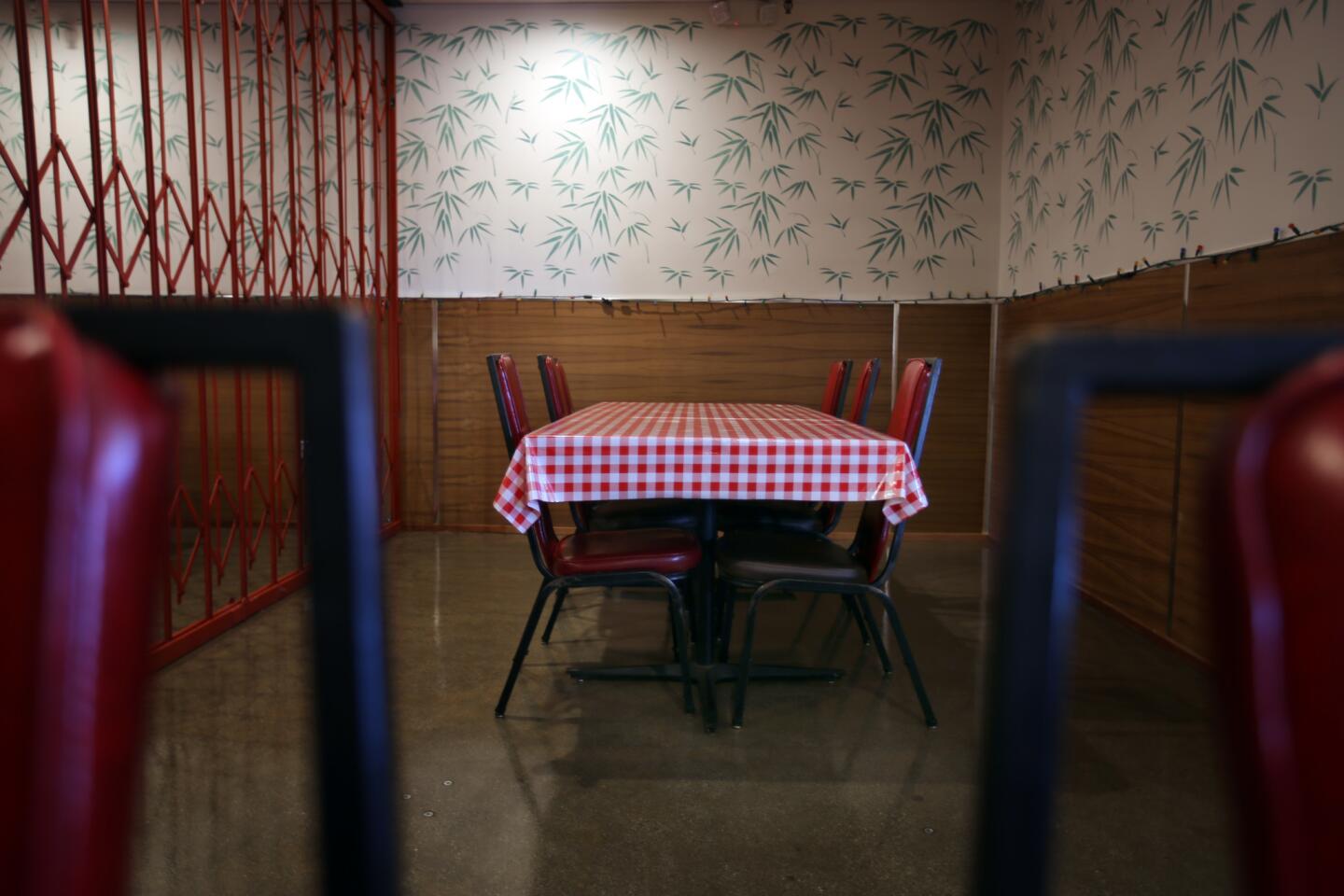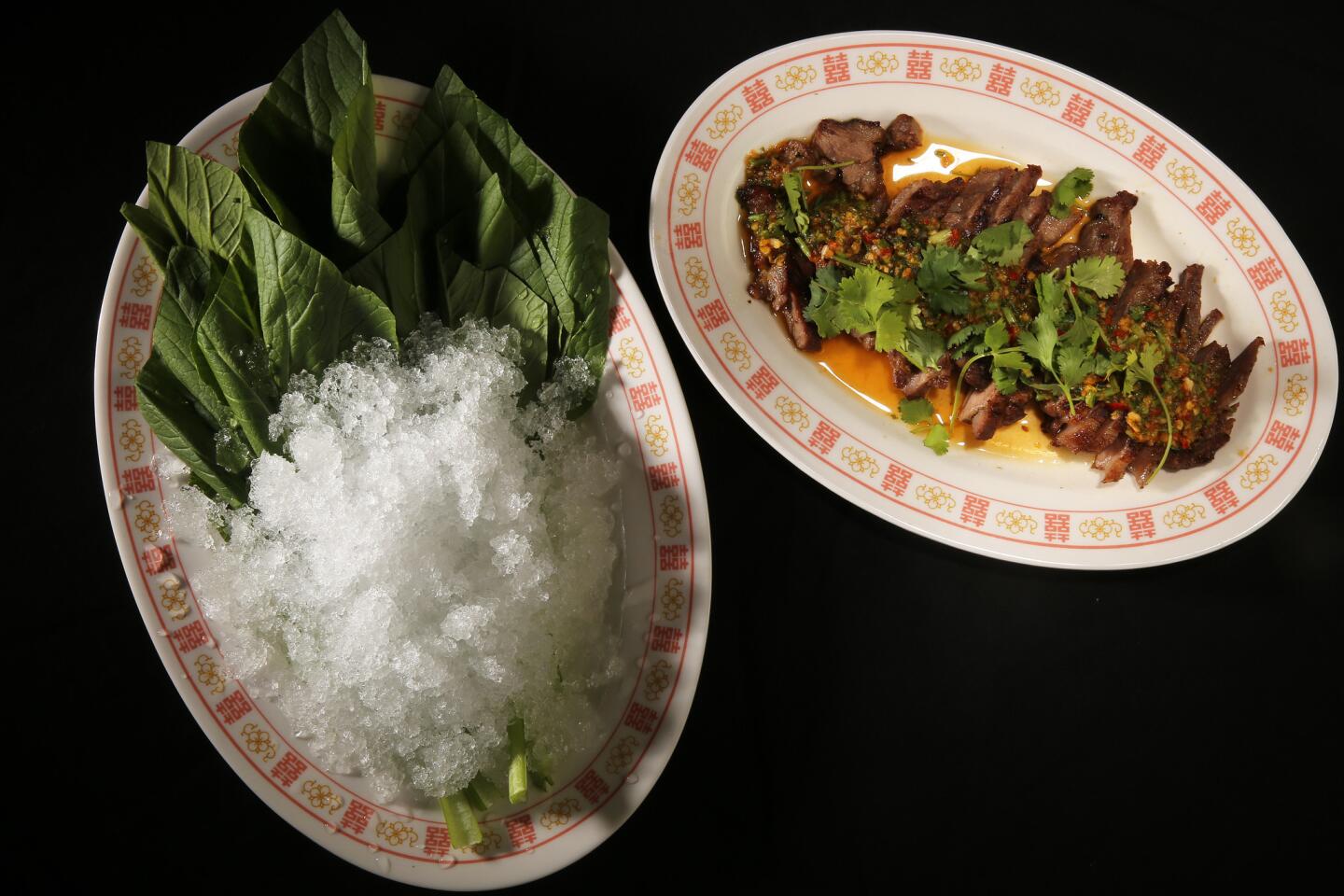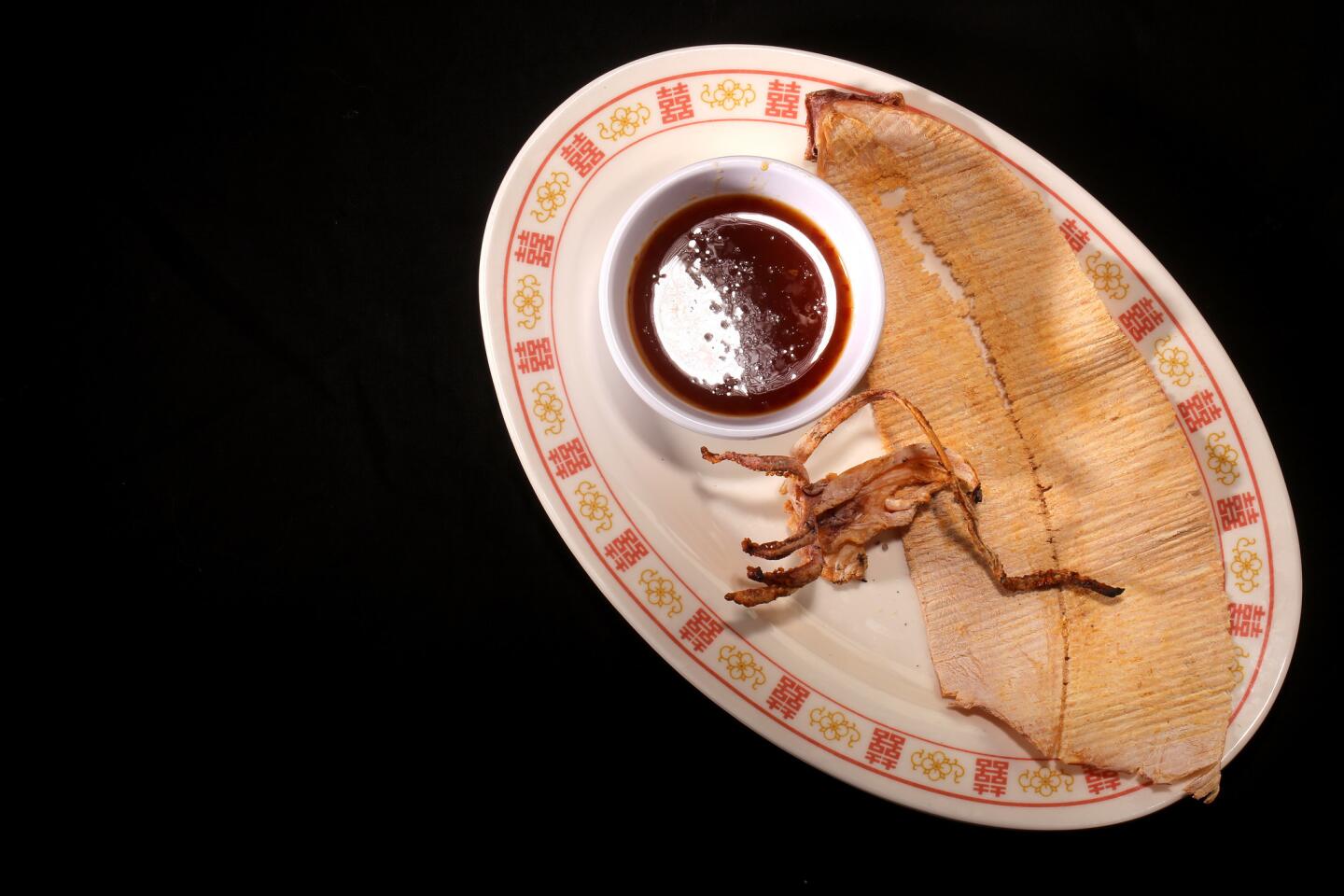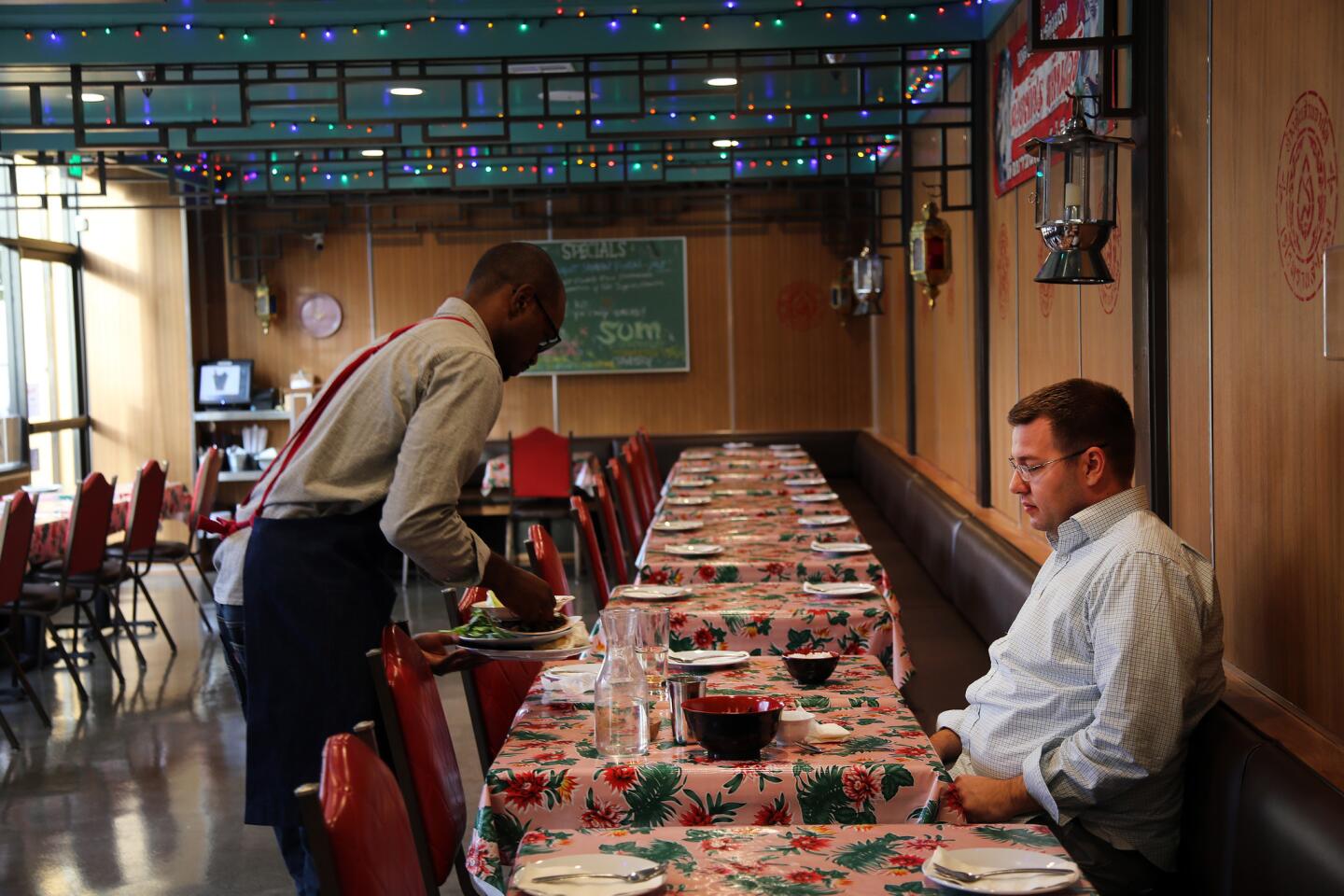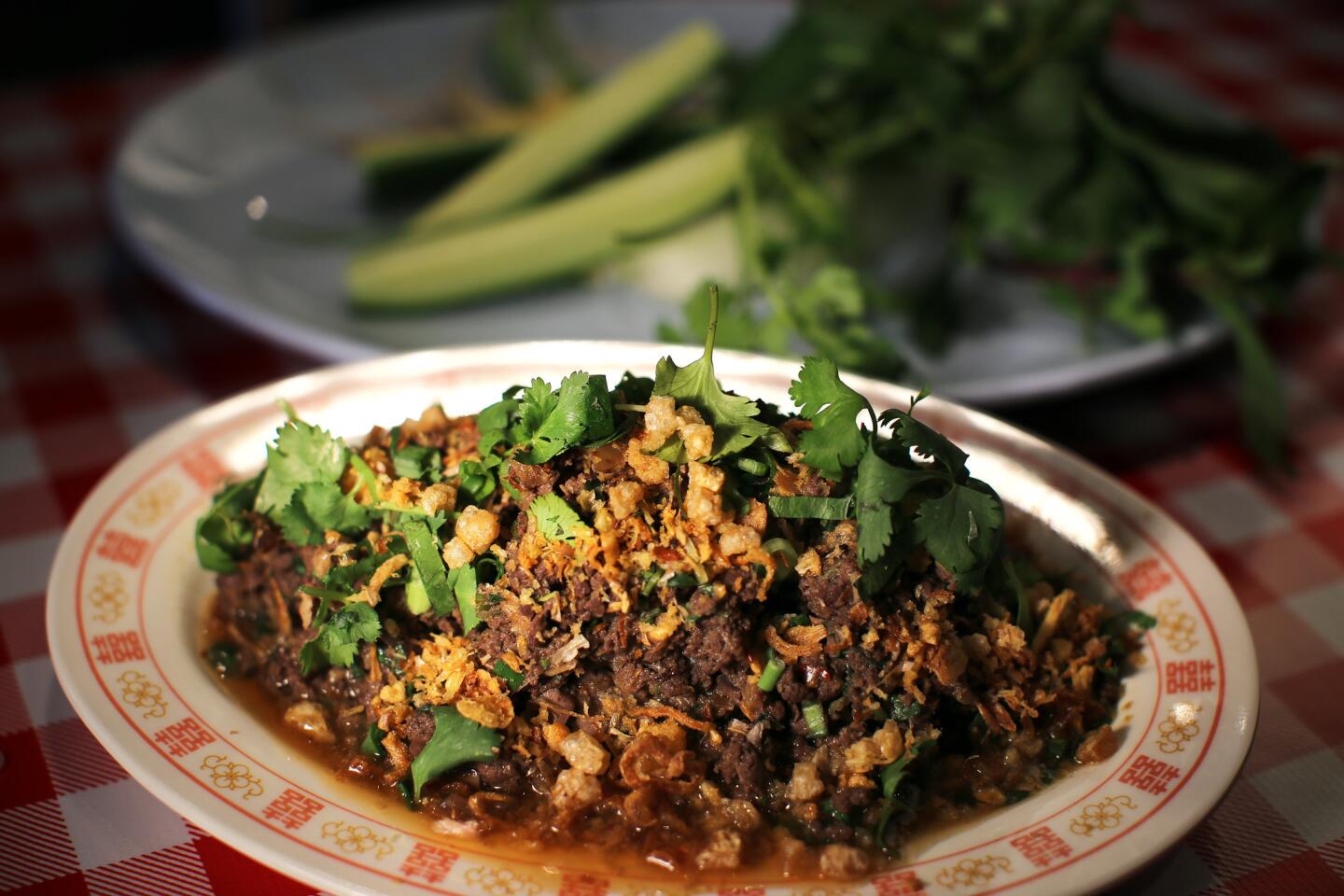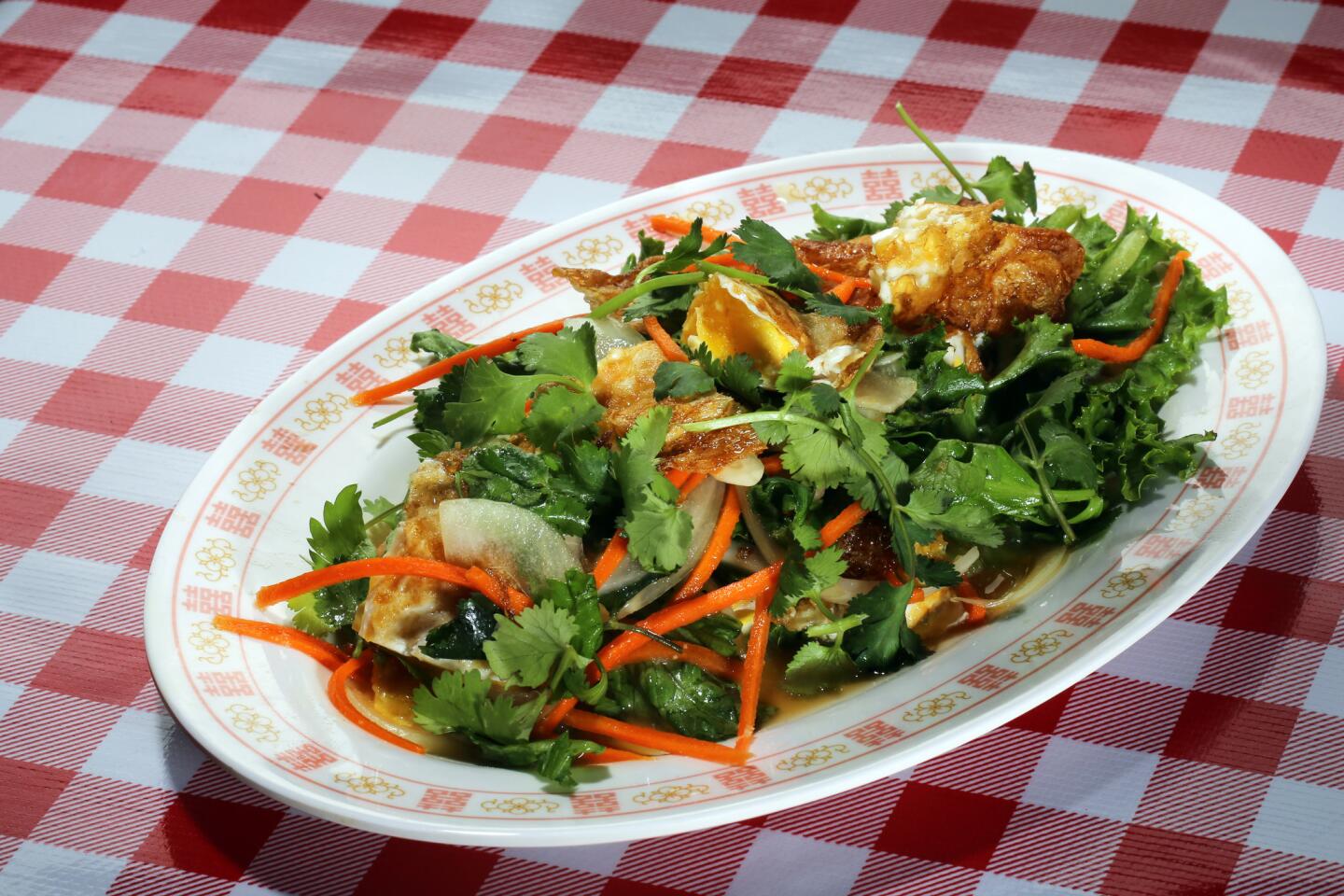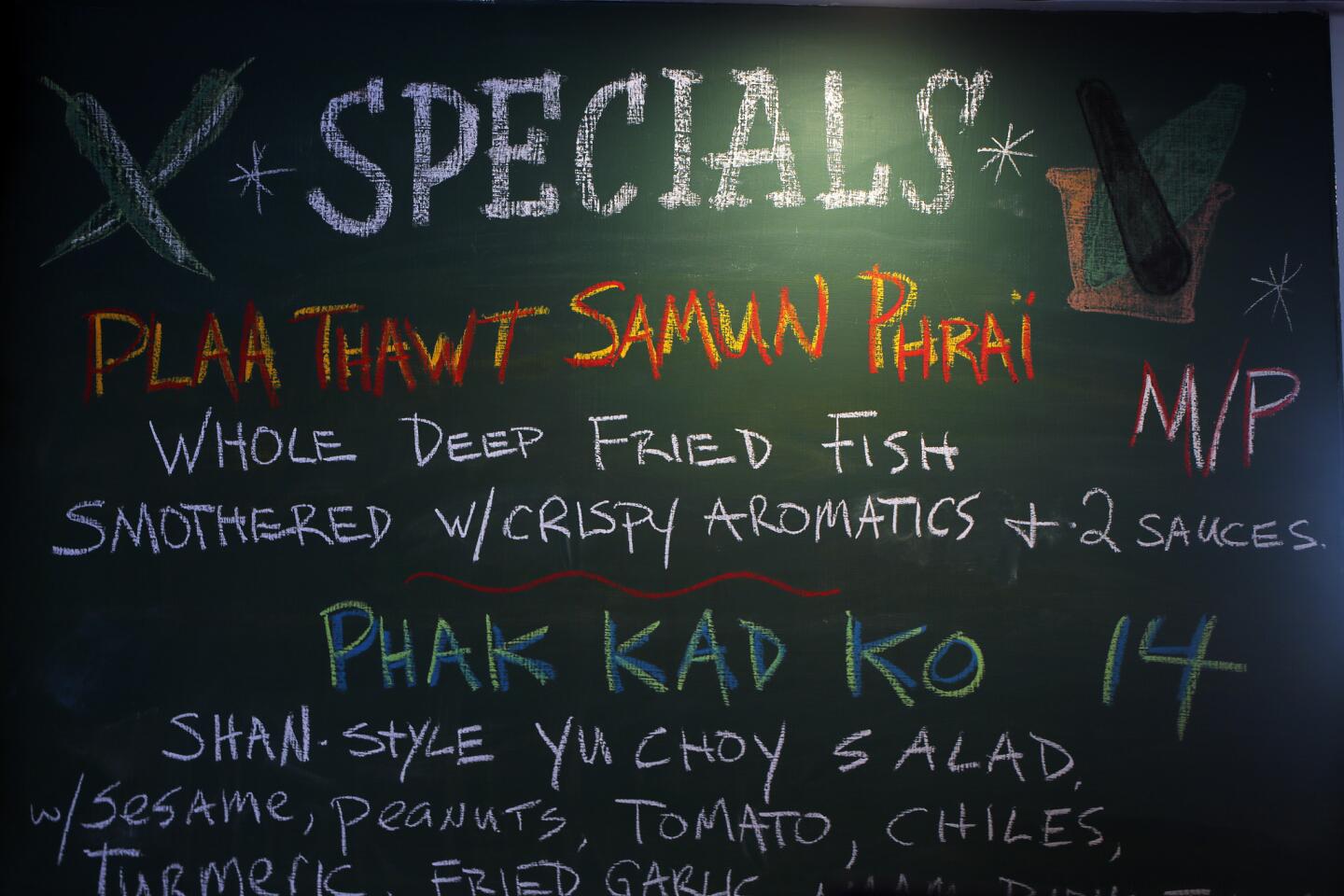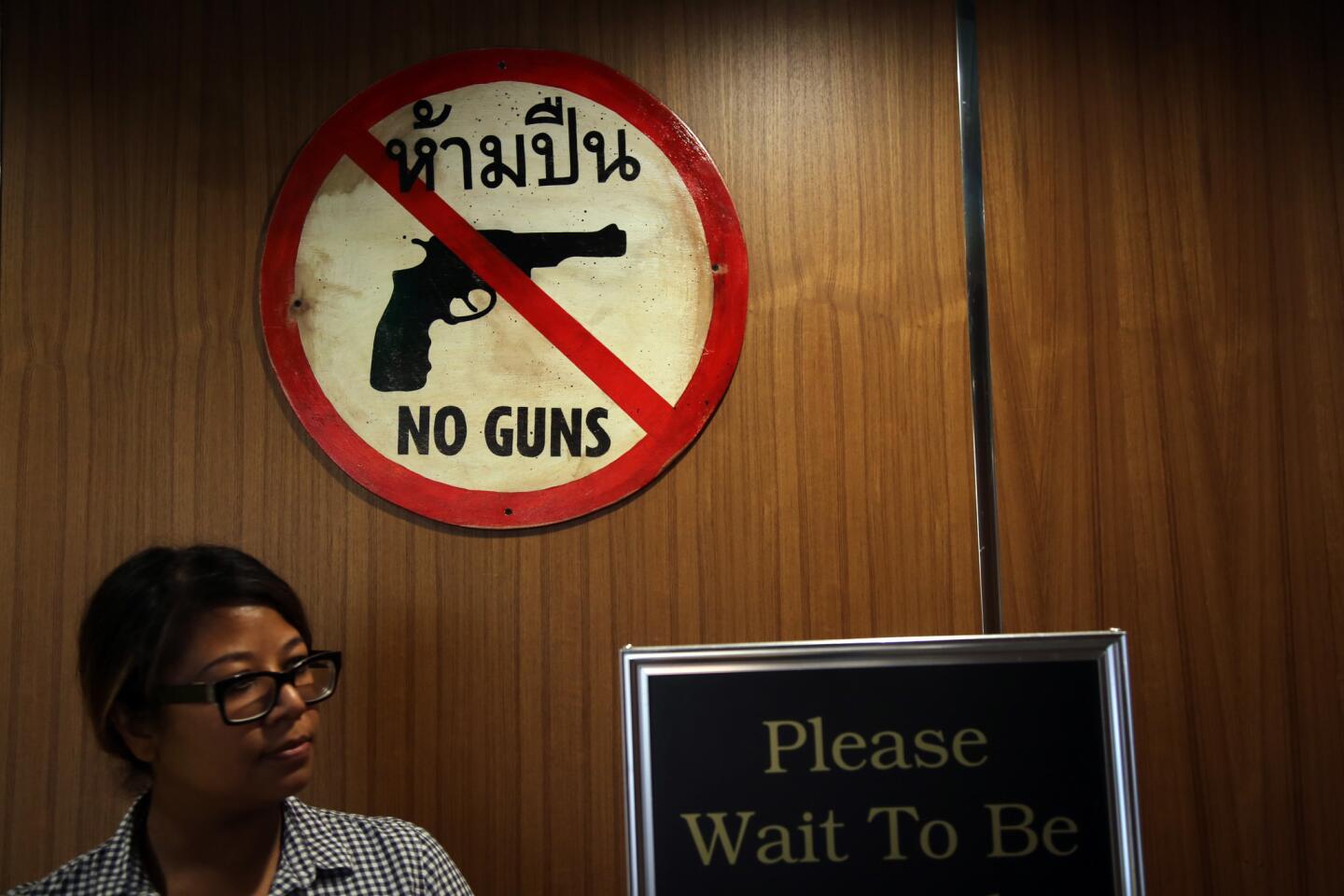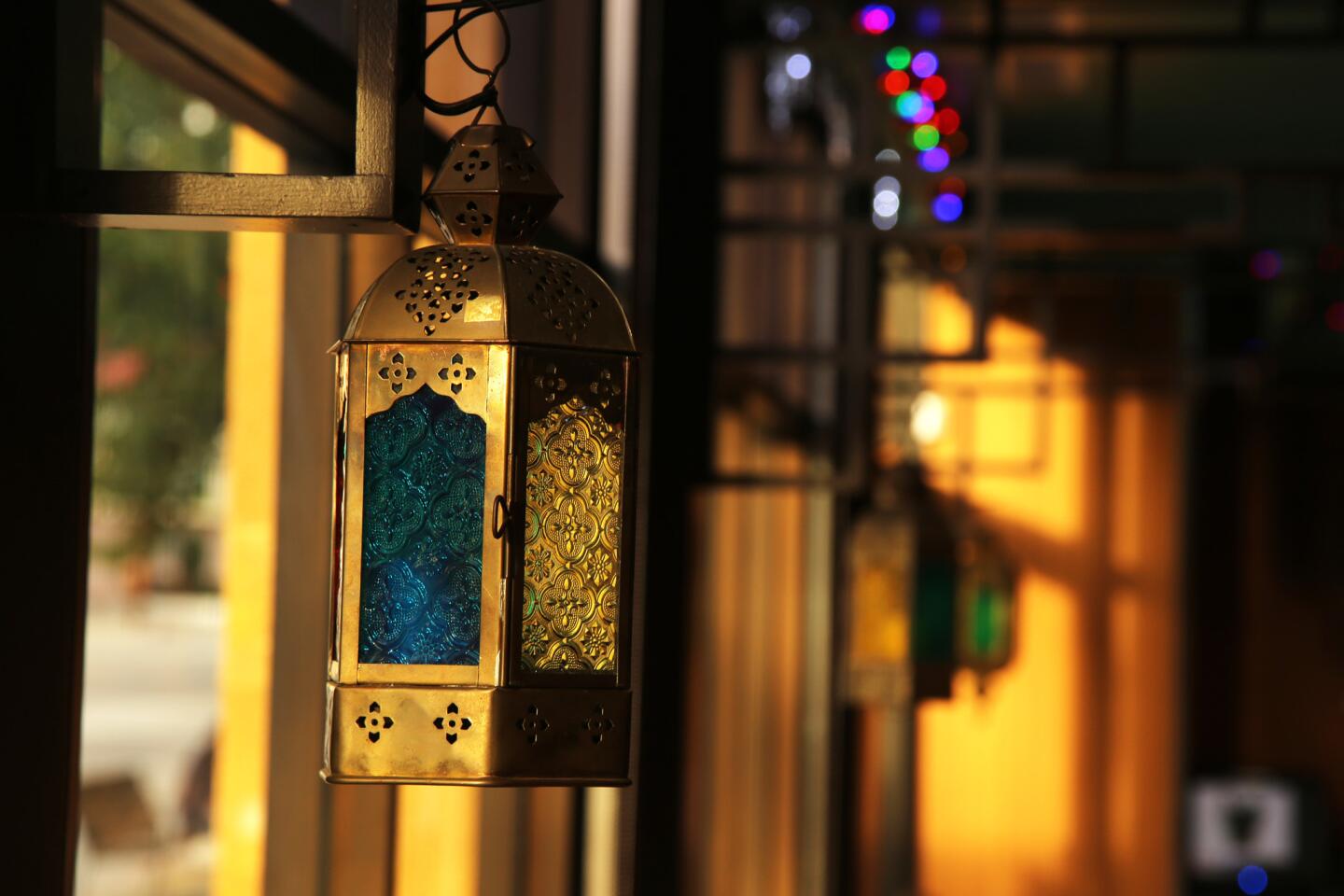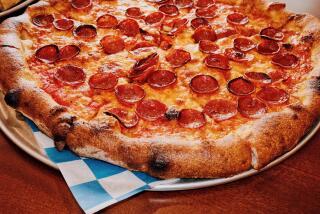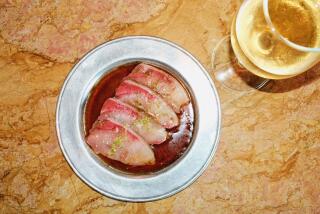Review: Andy Ricker’s Pok Pok brings a genuine taste of Thailand to L.A.
- Share via
Is it possible to become converted in a single bite? Because with a single fried chicken wing at the original Portland Pok Pok in 2007, I dropped my prejudices about non-European cooking in Oregon, the crossover potential of extreme Asian funk, and the ability of a non-Thai to prepare anything like upcountry Thai food.
It was a remarkable chicken wing — burnished and crunchy, just sweet enough to punch up its deep caramelization, and a lot spicier than I thought it might be; lashed with enough fish sauce to dial the stink up to a heroic level. It was salty, very salty. The only possible reaction was to drain half a bottle of Singha, then reach for another wing. I am not sure how many chicken wings we went through that night, but we reordered them at least twice.
SIGN UP for Jonathan Gold’s Counter Intelligence dining newsletter >>
I had been dragged to Pok Pok by my friend Karen Brooks, then the restaurant critic for the Oregonian. She was about to name it Portland’s restaurant of the year, which was not an honor generally awarded to a Thai restaurant in a transitional neighborhood, and she thought that the chef, Andy Ricker, was brilliant. I had tried to get her to take me to Le Pigeon instead, but she was right to insist. After plate after plate of grilled animal parts, sticky rice, blackened game hens, odd Mekong-whiskey cocktails and super-pungent Northern Thai salads, it was obvious that Pok Pok was one of the most challenging Thai restaurants on the West Coast.
So eight years, many affiliated restaurants, a James Beard award, a Michelin star and a Chinatown noodle stand later, here we are at Pok Pok Los Angeles, an enormous restaurant in the old Fu Ling space in the Mandarin Plaza at the relatively deserted north end of Chinatown. Pok Pok’s line of Thai drinking vinegars is commercially available at Asian markets now, and you can buy its special charcoal, processed from rambutan wood, on Amazon. Banking on a rush of people eager to eat his famous cooking, Ricker flirted with a 5% service charge for kitchen staff and a system of prepaid reservations in the restaurant’s first weeks, although he ultimately gave them up when the customers became confused. (There was no listed phone number at first, and a friend felt it necessary to physically travel to the restaurant to change her reservation.) The Pok Pok cookbook sells briskly. The logo is recognizable on a T-shirt a block away.
You would not be wrong to consider Pok Pok a lifestyle brand, a carefully engineered import that pushes all the correct buttons of grit and authenticity, like a well-made cortado or a limited-edition hoodie from Supreme. If you have visited a Pok Pok in Portland or Brooklyn, you will be surprised by neither the year-round Christmas lights nor the surreal Thai versions of 1970s soul on the stereo, the vintage knickknacks nor the exotic bottles at the bar. The waiters will explain every scrap of coriander root, every pickled mustard green, whether you want them to or not.
My critical-studies friends are already grumbling about issues of colonial logic and cultural appropriation. And it’s true — in Los Angeles, unlike Brooklyn or aught-era Portland, there is no shortage of restaurants featuring Thai chefs cooking Thai dishes for Thai expats (and non-Thais who wish to eat like Thais). If you were a local restaurateur eking out her living one bowl of boat noodles at a time, it is easy to see how you might resent Pok Pok’s media attention and glamour.
As the professors say: There is a lot to unpack.
Still, Pok Pok’s Singha on draft is frosty. The gin and tonic is beautifully punched up with makrut lime. The bar snacks — grilled dried cuttlefish with chiles, buffalo jerky, deep-fried patties of the pork salad called larb — are light, spicy and delicious. The music is pretty close to the best 10 minutes of a Henry Rollins podcast. There would be a lot of good reasons to drop by even if the food weren’t good.
Ricker’s gift is the ability to make Thai food seem new again, to take it out of that comfortable place in the suburban strip mall, where it has become the default takeout comfort food for a huge chunk of Los Angeles, and put it back into the roadside stands and rural villages of Northern Thailand; not just chile heat but acrid herbs, tons of citrus, the pong of dried fish and an almost total absence of mellowing oils.
The noodles here are basically limited to a gnarly version of the Southern rice-noodle dish khanom jin yam na, which you may know from Jitlada, and a restrained take on the Northern khao soi, which might make you yearn for the cheeseball coffee-creamer-laced versions in town. (Clearly, Ricker would like you to satisfy your noodle cravings at his excellent Pok Pok Phat Thai a few blocks south.) The short dessert list includes durian custard on sticky rice and a hot-dog bun stuffed with jackfruit ice cream.
The restaurant’s worldview barely acknowledges the existence of L.A.’s 40-year-old Thai restaurant culture — its recipes are brought straight from Thailand, like a carefully wrapped souvenir scarf. Even the pork satay, skewers of grilled meat served with peanut sauce, sweet-sour cucumber relish and grilled toast, which has been enjoyed in basically this form in Los Angeles since the 1970s, comes with the menu admonition: “Yes, bread really is the normal accompaniment in Thailand.”
So you have a beer or two. You munch on shrimp chips. You order more or less randomly, not forgetting to include a few tiny baskets of sticky rice. And then you kind of strap yourself in for the ride — strips of grilled boar collar served with iced, pickled mustard greens; weirdly chewy Chiang Mai pork sausage with pork cracklings and a roasted green chile dip; dense, dripping pennywort salad whirling with a dozen flavors you can’t quite process; minced pork larb whose funkiness is almost incandescent; and a northern-style herb salad with a dozen different layers of chewiness and stink. You are not quite sure what you have just experienced — a meal at Pok Pok can occasionally resemble that scene at the end of “2001: A Space Odyssey” when Keir Dullea flies through that tunnel of flashing lights — but you are safe, happy and slightly out of breath.
Why does Ricker serve soggy Brussels sprouts in a sugary fish sauce emulsion, pallid papaya salad and stewed beef shin that has spent an hour too long on the fire? Will the grilled Mary’s chicken ever be as good as the sticky, crunchy game hens in the Brooklyn restaurant, or the nam tok seasoning be as fierce as it is in Portland? Do Pok Pok’s ambience, carefully sourced ingredients and well-curated menu make a meal here worth 40% more than what you’d pay at your favorite North Hollywood dive? It’s hard to say.
But you’re probably not going to find a better version of cha ca, the dill-inflected fried catfish that is the obsession of almost everyone who has ever visited Hanoi, at least not within city limits, and the sweet northern-style pork belly curry is even better than the one that is one of my favorite dishes at Lotus of Siam in Las Vegas. And those chicken wings — after a few duff attempts, they’ve finally become the sweet, crisp marvels that made the original Pok Pok essential. You’ll find me hunched over a tamarind whiskey sour at the bar.
::
Pok Pok LA
Chef Andy Ricker goes all out in Chinatown.
LOCATION
978 N. Broadway, Los Angeles, (213) 613-1831, pokpokla.com.
PRICES
Drinking food, $3-$15; grilled things, $13-$18; one-plate dishes, $15-$20.
DETAILS
Open Sun.-Wed., noon to 10:30 p.m.; Thurs.-Sat., noon to midnight. (Abbreviated bar menu only from 3 p.m. to 5:30 p.m. and after 10:30 p.m.) Credit cards accepted. Full bar. Validated lot parking just north of the restaurant.
RECOMMENDED DISHES
Cha ca “La Vong” (fried catfish), Ike’s Vietnamese fish sauce wings, duck larb, pennywort salad, buffalo jerky.
More to Read
Eat your way across L.A.
Get our weekly Tasting Notes newsletter for reviews, news and more.
You may occasionally receive promotional content from the Los Angeles Times.
